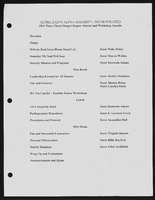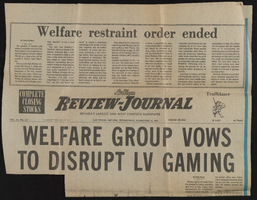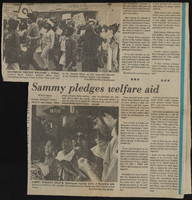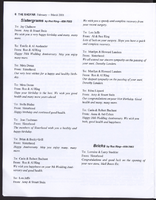Search the Special Collections and Archives Portal
Search Results

Alpha Kappa Alpha Sorority, Theta Theta Omega Chapter retreat: agenda and meeting documents
Date
Archival Collection
Description
From the Alpha Kappa Alpha Sorority, Incorporated, Theta Theta Omega Chapter Records (MS-01014) -- Chapter records file.
Text
Tarkanian, Jerry
Obituary from UNLV News Center:
Hall of Fame Basketball Coach Jerry Tarkanian Dies
LAS VEGAS - Legendary basketball coach Jerry Tarkanian, who took the Runnin’ Rebels to four Final Fours and brought home the national championship in 1990, died Wednesday, Feb. 11, 2015, in Las Vegas. He was 84.
A campus memorial event is being planned. Details will be announced soon.
Person


Helen J. Stewart Papers
Identifier
Abstract
The Helen J. Stewart Papers (1869-1978) document the life of Las Vegas, Nevada pioneer, Helen J. Stewart. It includes correspondence between Stewart and her children as well as various family legal papers and certificates. The collection also contains Helen J. Stewart's 70th birthday scrapbook, a ledger, and a day book from 1904-1919, as well as several photograph albums and information related to the family burial plot.
Archival Collection
Joshua Abbey Papers
Identifier
Abstract
Collection is comprised primarily of files from approximately the early 1980s to 2017 detailing Joshua Abbey's theater and film career; his involvement with environmental efforts in Southern Nevada such as the Citizens Against Nuclear Waste in Nevada (CANWIN); and his involvement with the Jewish community in Las Vegas, including the Jewish Film Festival, the Jewish Federation, Temple Beth Sholom, and other organizations. The collection also includes information about the Jewish Community Center from the 1950s and a file on the film production of
Archival Collection
Linda Miller Papers
Identifier
Abstract
The Linda Miller Papers (2008-2024) document Dr. Linda Miller's historic preservation work in Las Vegas, Nevada including her work portraying early Las Vegas resident, Helen J. Stewart, at historical events across Southern Nevada. The collection documents Miller's efforts to erect a statue of Helen Stewart at the Las Vegas, Nevada Old Mormon Fort, as well as her contributions to the programming for Sarah Winnemucca Day in 2018. The collection documents Miller's appearances as Helen J. Stewart through photographs, pamphlets, video recordings, digital files, and curriculum used for her outreach work. The collection also documents Dr. Miller's activities as chair for the Nevada State Society chapter of the National Society of the Daughters of the American Revolution (NSDAR) and as a member of the National Society Sons and Daughters of the Pilgrims Southern Nevada Chapter.
Archival Collection

Transcript of interview with Toni Clark by Joanne Goodwin, July 2, 1996
Date
Archival Collection
Description
Toni Clark (born Lena Gaglionese) spent her youth in Seattle, Washington where she was born on April 4, 1915 to Angelene and Salvatore Gaglionese. Her father and mother moved to the Seattle area when they immigrated to the United States from Naples, Italy years earlier. Salvatore worked as a street cleaner for the city of Seattle and Angelene cared for the house and family until her early death. Toni grew up with three siblings, her father and step-mother, and an uncle and cousins next door. After attending Seattle’s Franklin High School for three years, she left. “I just didn’t like school so I quit,” she said, and spent the next couple of years at home. From these simple origins, Toni became “the first lady of Las Vegas” as some admirers called her, referring to the role she played in the transformation of Las Vegas from a frontier town into a glamorous resort town during the 1950s and 1960s. In 1941, before the Second World War began, Toni traveled to San Diego to visit friends and decided to stay. After a year of caring for a young boy, she moved into the Barbara Worth Hotel which was owned by Wilbur Clark. Clark’s father ran the hotel and suggested that Toni apply for a job at his son’s new bar and restaurant, the Monte Carlo. She had not met Wilbur Clark at the time and her shyness dissuaded her from making the move. Nevertheless, she did apply and went to work as the hostess of the Monte Carlo in downtown San Diego. Wilbur and Toni’s courtship began slowly. He gave her the name Toni, saying she “looked more like a Toni than a Lena,” and she kept it. In 1944, around the time Wilbur Clark relocated to Las Vegas where he had purchased the El Rancho Hotel, the couple married in Reno, Nevada and permanently made Las Vegas their home. Clark’s involvement in Las Vegas clubs and gambling expanded with the Monte Carlo downtown and the Player’s Club on the strip. But his dream to create a luxury resort hotel came to fruition when the Desert Inn opened in 1950. The fifth major property on the strip, the Desert Inn had several features that distinguished it from other places. The Skyroom offered a private club atmosphere for talking, music, and dancing. The Monte Carlo Room served French cuisine. The Doll House provided round-the-clock childcare for children of hotel guests. The Painted Desert Room, the property’s showroom, featured top performers and the Donn Arden Dancers. All these features combined to create a resort that offered guests an exquisite setting for a gambling vacation. Toni Clark had a special place at the heart of the Desert Inn’s social life. She brought a gracious and elegant charm to social events associated with the property. Although she said she was never involved in the business of the hotel-casino, she played a unique role setting a new tone for the enterprise. She entertained guests and dignitaries at the hotel as well as her home; organized fashion shows featuring the top designers of the time for the wives of high-rollers; and created celebrations of special events, notably her husband’s late December birthday, with annual parties. When Wilbur Clark died in 1965, Toni Clark remained active in the city’s social life. She did not disappear as others had, but continued to plan and attend social functions. As part of her service to the community, she took particular pleasure in her work with the Variety Club. She continued to reside in Las Vegas until her death in 2006.
Text

